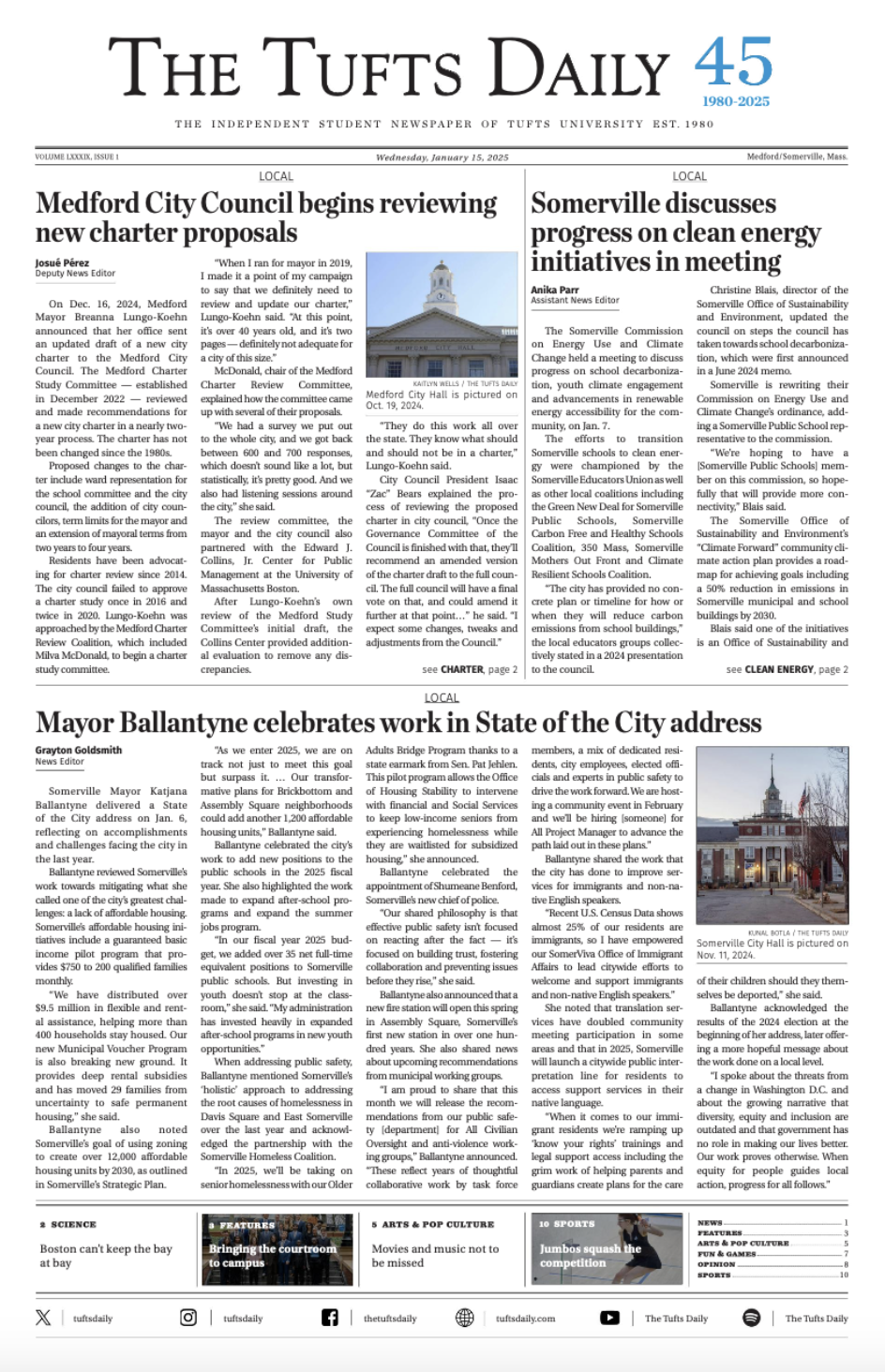Every four years, a spotlight beams upon a select few states that often determine the outcome of the U.S. presidential election. Seven battleground states will play a hand in deciding the fate of this year’s general election, including Michigan, Pennsylvania and Georgia. Voters from these states carry an immense burden, whether voting in person or thousands of miles away.
Undergraduate students from these states, especially those voting for the first time, face additional pressures. Tufts students Grant Pinsley, Sam Manasso and Harry Leibovich, all of whom are from swing states, described their experiences during election seasons. All three of them have already voted for Vice President Kamala Harris.
Pinsley, a first-year from Pennsylvania, provided an optimistic take on voting within a battleground state.
“I take it as a privilege, in its own way, to be voting in a swing state,” Pinsley said. “I have a lot more power in my vote than most people, which I think is unfortunate and I think is incorrect, but it is the case.”
This is Pinsley’s first election. He said he understands the stress that comes with voting and the external pressures often put on young people.
“I think a lot of the anxiety around voting is a lack of knowledge or a perceived lack of knowledge, at least,” he said. “People [at Tufts] are generally passionate about voting; … it’s just a matter of how much information they have.”
Manasso, a sophomore from Georgia, is passionate about voting but misses being directly involved in her community.
“Here, I feel the power of voting and being able to make a difference in that way, but … I feel weirdly disconnected from where I am [from],” Manasso said. “I feel more nervous about it because I can’t see what’s happening.”
Leibovich, a sophomore from Pennsylvania, expressed his excitement about voting while contrasting his active political involvement with that of other Tufts students.
“I purposely try to tune out … the drama of it all,” Leibovich said.
Similar to many college students, Pinsley, Manasso and Leibovich all mailed in their ballots this year.
Leibovich and Pinsley did not face many restrictions when it came to mail-in voting.
“I’m also privileged enough to be from a swing state that is relatively open to mail-in votes,” Pinsley said.
In comparison, Manasso highlighted the difficulties that voters from Georgia must handle.
“For a lot of people, [Georgia has] a barrier: There’s an earlier deadline to register [and] it’s an earlier deadline to request your ballot,” Manasso said.
In addition to earlier deadlines, Georgia has created new ID requirements for mail-in ballots and shortened the runoff voting window. Other states with Republican-controlled legislatures have made similar restrictions.
Younger voters in these swing states are often scrutinized more closely, as 18–24-year-olds are known to have lower voter turnout than other age groups.
Leibovich described his experience with older generations asking a younger person about voting.
“What I get is a scornful ask [of] ‘Did you vote?’ expecting [that] I didn’t,” he said.
Pinsley argued that because politicians cater to groups that show higher voter turnout, younger generations should vote more to gain more of a voice in policy making.
“At the end of the day, politicians understand that everything is a numbers game, and so if they see different numbers, they will react to that,” Pinsley said.
Manasso addressed the different mentalities of youth voters in different states and how sometimes people from a state that leans heavily towards one political party think that voting has less impact.
Manasso pushed back against the common sentiment that voting in states that typically lean red or blue matters less than in swing states.
“Even if you don’t feel like it’s important to vote in the national election — which I think it is — it’s so important to vote in local elections too because that's affecting you,” Manasso said.
She also noted that certain federal policy changes on issues like abortion would have different effects on Massachusetts and Georgia, and that those differences can impact voters’ motivations.
“It kind of feels like the people here feel like the work is done and so there’s not as much urgency,” she said.
Pinsley agreed, emphasizing that people can make a difference at all levels, including local and national.
“It’s very rare to actually be in a place where you have no impact,” Pinsley said.
Manasso and Pinsley have taken their passion for voting outside the booth and into their communities. Even before they were able to vote, both participated in text and call banks and did in-person canvassing to promote candidates in local, state and national elections.
Pinsley said that the work he has done has been difficult but rewarding.
“It’s definitely empowering. It’s pretty grueling, but that is how you make change,” he said. “It’s hard, but it’s always hard to make change. But the more people that do it, the easier it gets.”
On campus, these students have different approaches when it comes to having conversations with their peers about voting.
“I personally don’t want to jeopardize my personal relationships with somebody else because of … who or what they vote for,” Leibovich said.
Pinsley somewhat agreed with the idea that he would rather get people to vote than convince them who to vote for.
“The reason why young people aren’t paid attention to or taken seriously is because we don’t vote,” Pinsley said.
Manasso narrowed it down to a few main arguments that she would make to a peer if they were unsure about voting.
“[I would] deconstruct the idea of voting, … [letting people] know that there’s a lot of information out there that’s easily consumable,” Manasso said. “I [would] think a lot about … my life, and what I like about it and the people that I love and the way their lives would be changed — even if [my vote] wouldn’t affect me directly.”






